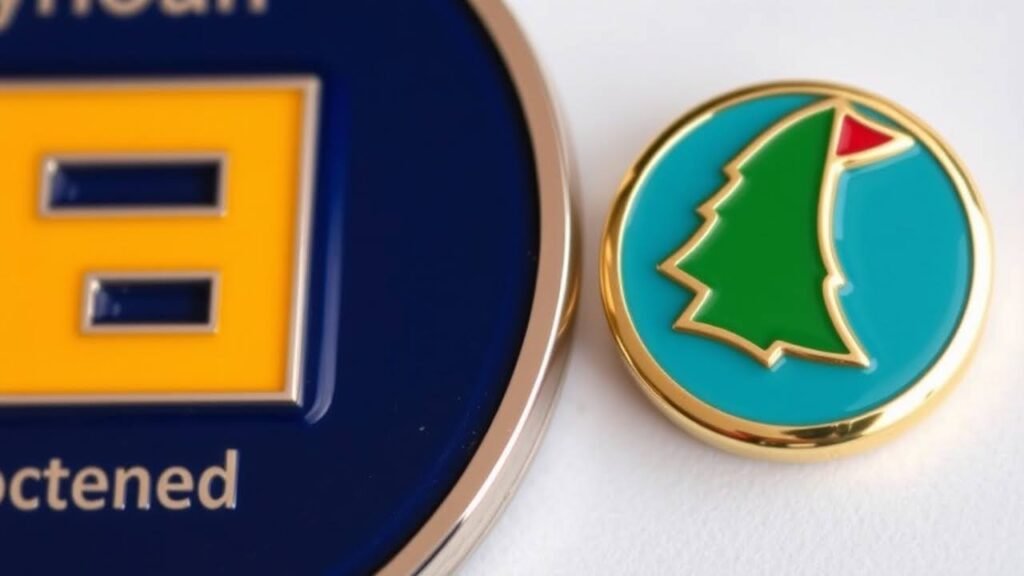
So, you’re diving into the world of custom enamel pins, huh? That’s awesome! Enamel pins are super popular right now, and for good reason. They’re a fantastic way to express yourself, promote your brand, or just add some flair to your jacket or backpack. But before you can start showing off your custom product, you’ve gotta figure out what kind of enamel pin you want. And that’s where the great debate begins: hard enamel vs. soft enamel. Don’t worry, it’s not as complicated as it sounds. Let’s break it down and figure out which pin type is right for your needs and design preferences.
Understanding Enamel Pins
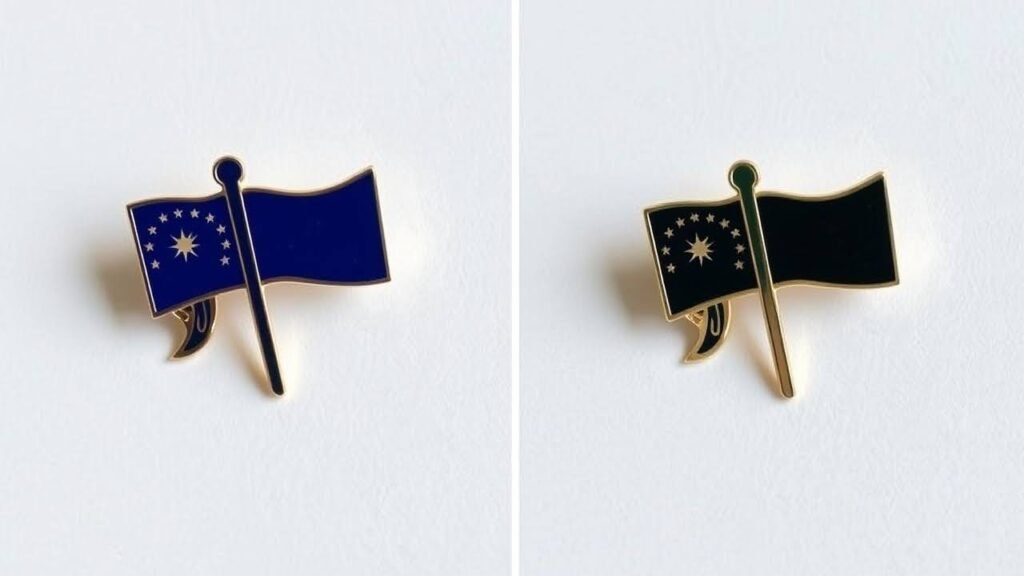
What is an Enamel Pin?
An enamel pin is a type of pin that features vibrant colors and can be customized to fit various designs. There are different types of pins, including printed pins, hat pins, and cloisonné pins, which are known for their professional look. Pin designers often choose between soft and hard enamel pins based on the feel of hard enamel and the desired enamel option. The design process includes creating recessed areas of the design and deciding whether to make hard enamel pins or making soft enamel pins with colored enamel.
High-quality pins, such as clutch pins, often involve an ordering process that ensures the highest quality custom results. Pin badges made with epoxy can enhance durability, while pins have raised elements for added texture. The overfill technique ensures that colors remain vibrant and give a smooth and shiny finish. Whether you’re looking to make pins for a special event or to showcase your brand, they are a great way to express creativity and style.
The Popularity of Custom Enamel Pins
Custom enamel pins have exploded in popularity, and for good reason! They offer a unique blend of personalization and collectibility. A custom pin allows individuals and businesses to create something truly unique. Whether it’s a custom logo pin for your company, a fun design representing your favorite hobby, or a commemorative pin for a special event, the possibilities are endless. Plus, enamel lapel pins are relatively affordable, making them accessible to a wide audience. This is great if you want to order custom pins for your community or team. Their collectibility and versatility fuel the continuous growth of custom enamel pin popularity. The pins also make great custom products for promoting your brand or idea.
Applications of Enamel Pins in Modern Culture
Enamel pins have permeated modern culture in countless ways. Think about it: you see them everywhere! Musicians and bands use custom enamel pins as merchandise, offering fans a tangible piece of their brand. Businesses create custom logo pins for employees or promotional giveaways. Artists design and sell their own enamel pin designs, turning their artwork into wearable art. And let’s not forget the collector community, trading pins and showcasing their prized possessions. From expressing personal style to promoting businesses and supporting causes, enamel pins have become a versatile and ubiquitous form of expression, adding a touch of personality and flair to our everyday lives. The custom hard enamel pin option, with its smooth finish, further enhances this appeal.
Hard Enamel vs. Soft Enamel
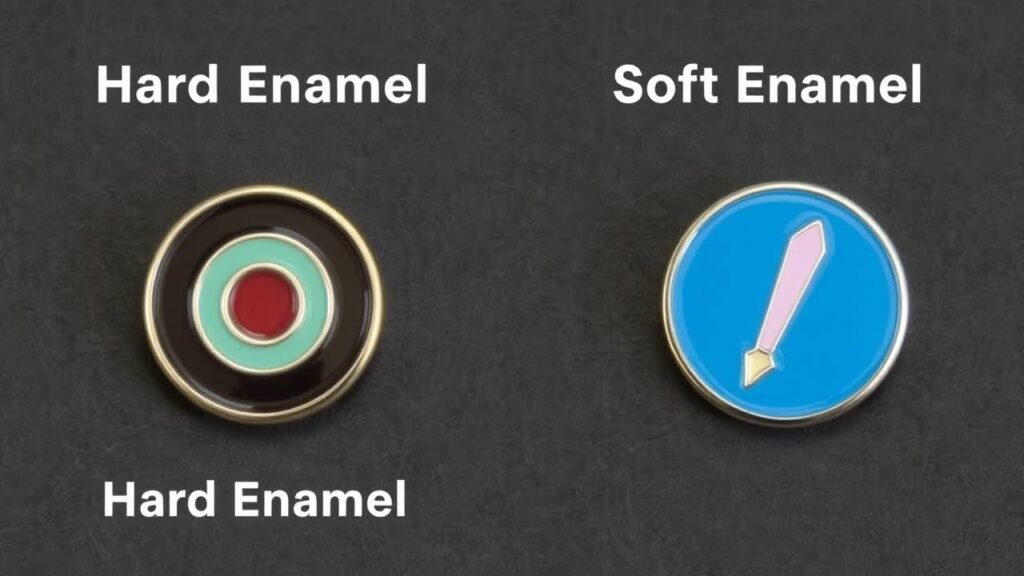
Characteristics of Hard Enamel Pins
Let’s dive into what makes a hard enamel pin special. These custom pins are known for their smooth finish. The enamel paint is filled into the die struck pins so that it reaches the same level as the metal lines, and then it’s polished down to create a flawlessly flat surface. This enamel process gives them a high-end look and feel, often associated with quality custom work. If you’re aiming for a professional or sophisticated look, or want your pin design to convey a sense of elegance, then hard enamel is often the way to go. Due to the polishing process in production, these hard enamel pins are extremely durable, resisting scratches and wear and tear much better than their soft enamel counterparts. This is good to consider if you plan to sell your custom product.
Characteristics of Soft Enamel Pins
Now, let’s talk about soft enamel pins! Unlike hard enamel, with soft enamel pins the enamel colors aren’t polished down to be flush with the metal plating. Instead, the enamel remains slightly recessed, creating a textured surface you can feel. This texture adds a lot of character to the pin design, giving it a more handcrafted and unique appearance. Also, soft enamel pins aren’t as expensive to produce as hard enamel pins. The die-struck pins can be filled with enamel and baked to create the custom enamel pin, without the need for polishing the product. Soft enamel pins are perfect for designs that want to emphasize detail and depth, making each custom lapel and trading pin stand out with its tactile charm. Many enamel pin makers use this method of production.
Soft Enamel vs Hard Enamel: Key Differences
Okay, let’s get down to the nitty-gritty of soft enamel vs hard enamel pins and understand the difference between soft enamel and hard enamel pins! The biggest difference lies in the surface texture: hard enamel has a smooth finish, while soft enamel has a noticeable texture. Hard enamel pins tend to be more expensive due to the additional polishing step in the enamel process. Soft enamel pins are typically more cost-effective, making them a great option when you order custom pins in larger quantities. Also, consider the perceived value. Hard enamel often feels more luxurious, while soft enamel has a more handcrafted feel. Ultimately, the best pin type depends on your pin design, budget, and the look you’re trying to achieve for your custom pin. Some enamel pin manufacturers can provide you with proof of concept before you decide on the custom hard enamel pin or soft enamel pin version.
Choosing the Right Custom Pin

Factors to Consider When Ordering Custom Pins
When you decide to order custom pins, several factors come into play beyond just the hard and soft enamel decision. First, think about your pin design. Intricate details might be better showcased with soft enamel, as the recessed areas create depth and enhance the texture. On the other hand, a simpler, cleaner design might shine with the smooth finish of hard enamel. Second, consider your budget. Soft enamel pins are typically more cost-effective, making them a great option when you are looking for a more economical custom product. Finally, think about the intended use of your custom pin. Is it a promotional item, a collector’s item, or a fashion accessory? Considering all these things when you order custom pins will ensure you get the perfect enamel pin for your needs.
Perceived Value of Hard vs. Soft Enamel Pins
The perceived value of hard and soft enamel pins can significantly impact your audience’s perception of your brand or message. Hard enamel pins, with their smooth finish and high-end appearance, often convey a sense of quality custom work and sophistication. This pin type might be preferable if you want to create a luxurious or professional image. A custom hard enamel pin is often seen as more valuable, making it an excellent choice for collector’s items or special gifts. On the other hand, soft enamel pins have a more tactile and handcrafted feel, which can appeal to those who appreciate uniqueness and character. Understanding the perceived value of each pin type can help you make an informed decision based on your target audience and brand identity. Many enamel pin manufacturers use both hard and soft enamel pin options.
Perceived Value of Hard vs. Soft Enamel Pins
The perceived value of hard and soft enamel pins can significantly impact your audience’s perception of your brand or message. Hard enamel pins, with their smooth finish and high-end appearance, often convey a sense of quality custom work and sophistication. This pin type might be preferable if you want to create a luxurious or professional image. A custom hard enamel pin is often seen as more valuable, making it an excellent choice for collector’s items or special gifts. On the other hand, soft enamel pins have a more tactile and handcrafted feel, which can appeal to those who appreciate uniqueness and character. Understanding the perceived value of each pin type can help you make an informed decision based on your target audience and brand identity. Many enamel pin manufacturers use both hard and soft enamel pin options.
The Production Process of Enamel Pins
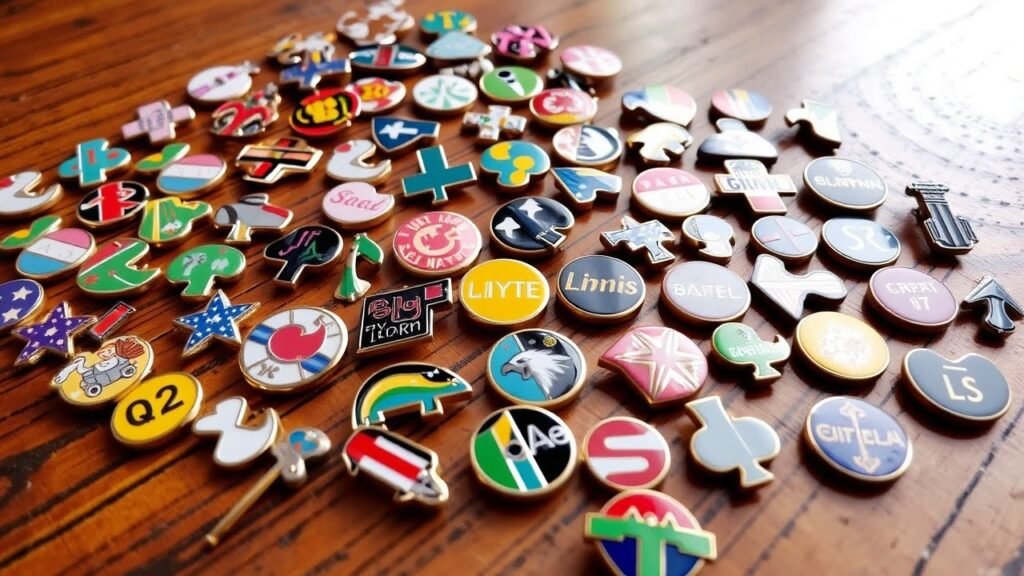
How Enamel Pins are Made
The production process of an enamel pin is a fascinating journey from an initial idea to a tangible, wearable piece of art. It all starts with the pin design, which is carefully crafted and then transferred onto a metal plate. The enamel pin manufacturer then uses a die-striking process to create the recessed areas that will hold the enamel colors. These die struck pins are then meticulously filled with enamel paint, ensuring each recessed area is perfectly covered. After that, the enamel pin is baked at high temperatures to harden the enamel colors. This entire enamel process is repeated with each custom enamel pin created
Die-Struck Pins vs. Electroplated Pins
In the realm of enamel pins, you’ll often hear about die-struck pins and electroplated pins, each offering distinct characteristics. Die-struck pins, as we’ve discussed, involve physically stamping the pin design into the metal plate, creating recessed areas for the enamel paint. Electroplating, on the other hand, is a process where a thin layer of metal is deposited onto the surface of the pin. This electroplate can be used to give the pin a specific color or finish, such as gold, silver, or black nickel. Both methods play crucial roles in the overall look and feel of the final custom pin. An enamel pin maker uses both of these methods to create a custom product.
Ready to Order Your Custom Enamel Pins
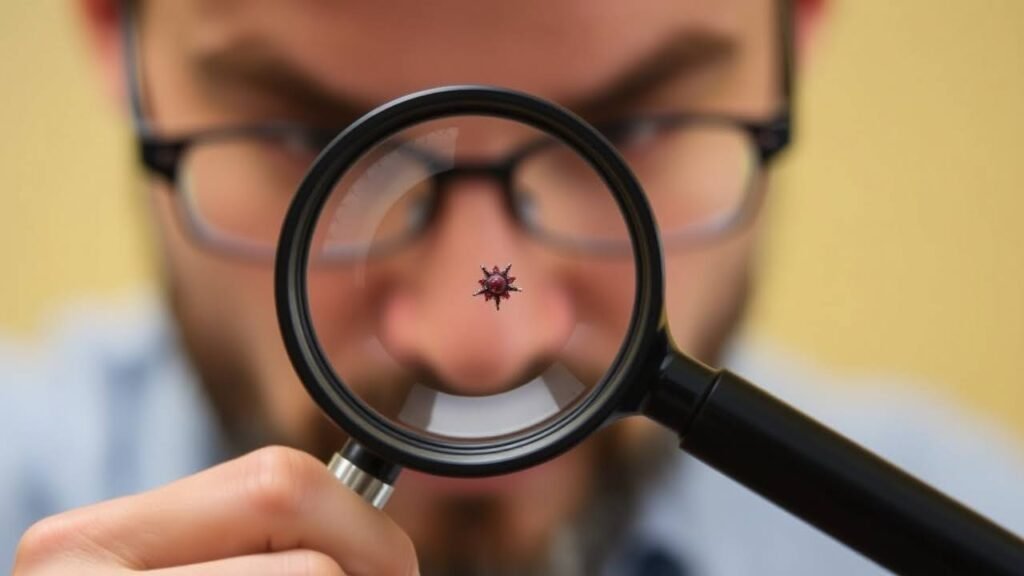
Where to Find an Enamel Pin Manufacturer
Finding the right enamel pin manufacturer is crucial for bringing your vision to life. Start by doing some online research and looking for companies that specialize in custom enamel pins. Read reviews and testimonials from previous customers to get a sense of their quality and service. Pay attention to their production process, turnaround times, and pricing. Don’t hesitate to reach out to several different manufacturers to request quotes and ask questions. The best enamel pin maker will be transparent, responsive, and willing to work with you to create the perfect custom enamel pin for your needs.
Tips for Ordering Custom Logo Pins
Ordering custom logo pins for your business or organization is a fantastic way to promote your brand and create a sense of unity. When ordering custom logo pins, make sure your logo is clear and easily recognizable, even at a small size. Consider using bold colors and simple shapes to make your logo stand out. Think about the overall design and how it will look as a custom pin. Choose a pin type (hard enamel or soft enamel) and metal finish that complements your brand’s aesthetic. Finally, order a sufficient quantity to meet your needs, keeping in mind that larger pin orders may qualify for bulk discounts. The pins also make great custom products.
Trading Pins: A Unique Custom Product
Trading pins are a unique custom product that brings people together, especially at events like sports tournaments. Among these, cloisonné pins stand out for their vibrant colors and intricate designs. These pins have a smooth, polished finish that enhances their visual appeal, making them highly sought after by collectors. Each pin tells a story, representing memories and achievements.
